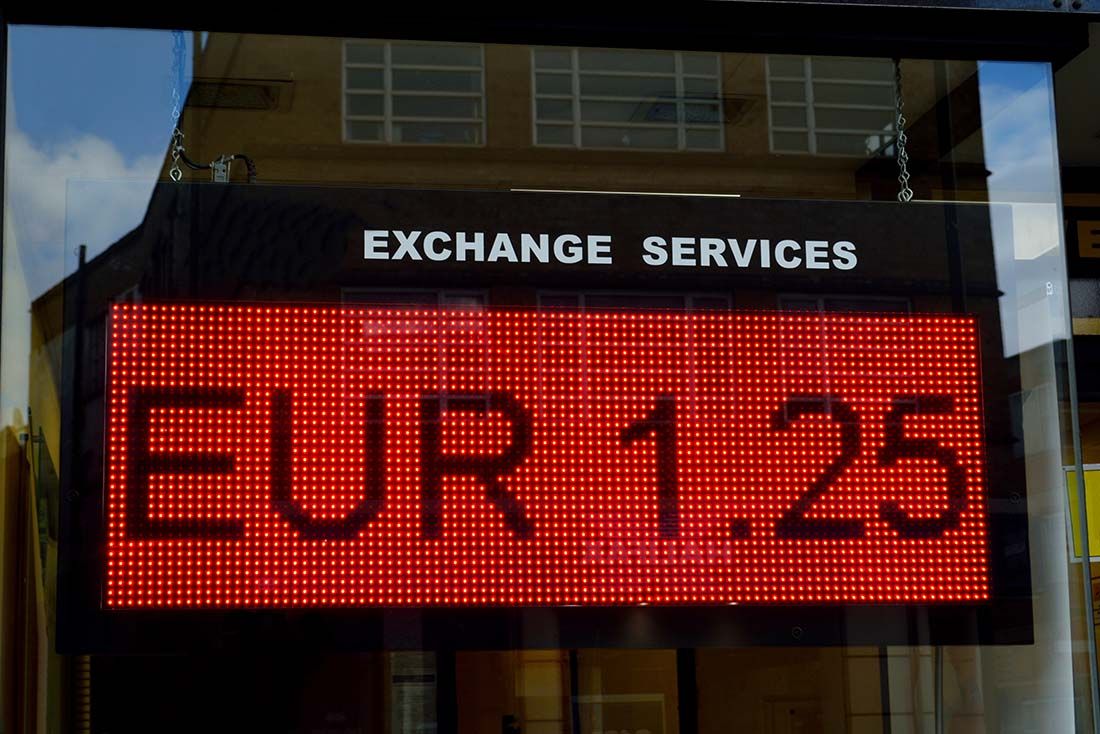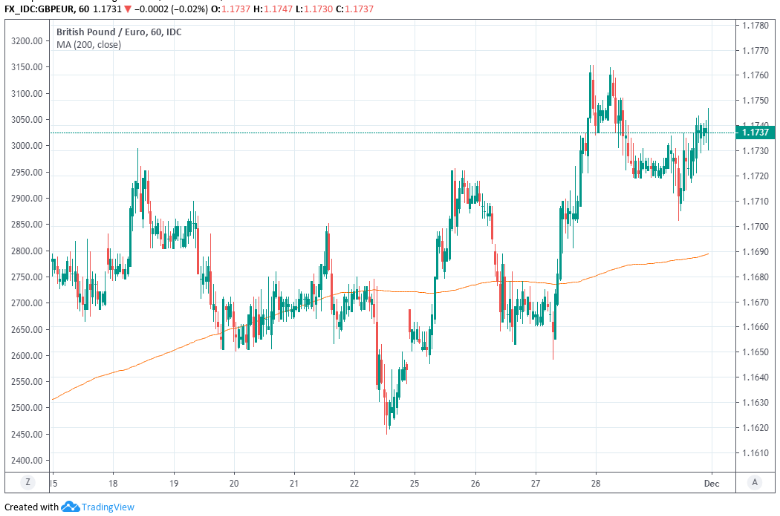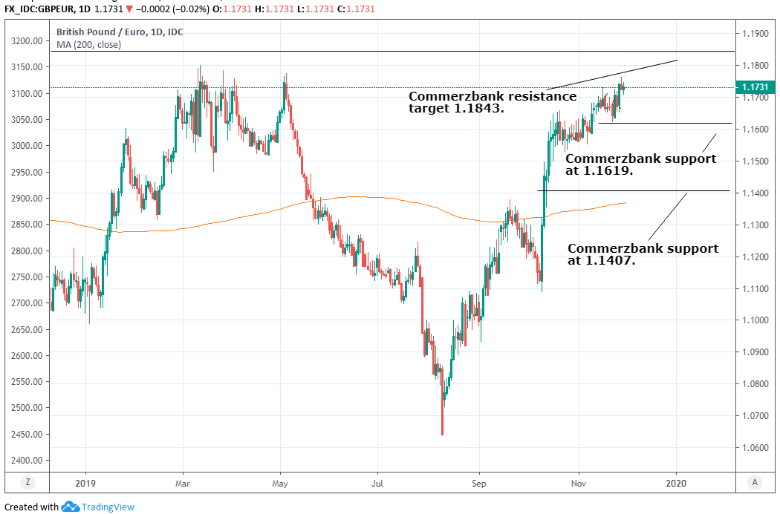The Pound-to-Euro Rate Week Ahead: Running Out of Road and Liable for Election Poll Losses
- Written by: James Skinner

Image © Adobe Images
- GBP retains initiative on charts but will meet resistance around 1.1843.
- GBP enters new week vulnerable to the latest election poll numbers.
- Support for Conservatives is ebbing broadly, poll watcher suggests.
- EUR constrained by German politics, U.S. decision on French 'DST' tax.
The Pound-to-Euro rate rose strongly last week and still retains the initiative on the charts, although it's approaching a level that's tipped to put up tough resistance while election headlines have this weekend turned into a headwind and could weigh on the British currency in the days ahead.
Sterling gained almost a full percent on the Euro last week even after a last minute surge by the single currency that came in spite of market fears over the Social Democratic Party (SPD) leadership election result that was announced in Germany over the weekend.
The Pound was lifted heading into the weekend by YouGov predictions of election victory for Prime Minister Boris Johnson and is now up more than 9% from its early-August lows beneath the 1.08 handle. Sterling is tipped to retain the intiative in the days ahead, but could soon find itself running out of road.
"EUR/GBP remains stuck below last week’s high at .8606 and has now eroded last week’s low at .8522. Below here lies the May low at .8465. We note the TD support at .8440 and we look for the market to hold here," says Karen Jones, head of technical analyis at Commerzbank, referring to the inverese of the Pound-to-Euro rate. "Above last week’s high at .8606 lies a minor downtrend channel resistance line at .8624 ahead of the four month downtrend line at .8767. Overhead resistance is reinforced by .8786 the mid-September low."
Above: Pound-to-Euro rate shown at hourly intervals.
Jones', who studies trends and momentum on the charts rather than economic fundamentals or election polls, has an 0.8440 target for the EUR/GBP rate that would put the Pound-to-Euro rate at 1.1843 and its highest level since May 2017. However, she's also said the uptrend in the exchange rate will probably falter at that point and has suggested that Sterling can be expected to find support at 1.1619, 1.1595 and 1.1407 upon any dips lower.
Some fundamental analysts say the exchange rate might not even get as far as Jones' target. And if the recent correlation between the currency and Conservative Party polling lead is anything to go by then the Pound could easily find itself on the defensive early in the new week.
Petr Krpata CFA, chief EMEA strategist for FX and bonds at ING, said last week that Sterling could go as far as 1.2048 against the Euro if the Conservative Party wins the December election but that further gains will be limited in the short-term to the 1.1764 threshold. The Pound has failed repeatedly to achieve a daily close above that level.
"The EUR/GBP 0.8500 level is proving strong support and we likely need to see a market friendly outcome from the general election on 12 December for the cross to persistently break this level. Indeed, so far this year (and since May 2017) EUR/GBP failed to close below the 0.8500 level. Should the Conservative party achieve a large majority, we expect EUR/GBP to dip to 0.8300. Yet, GBP strength beyond that should be limited," Krpata writes, in a note to clients.
Above: Pound-to-Euro rate shown at daily intervals.
AA
Pound Sterling: What to Watch
The Pound gained almost a full percent against the Euro and Dollar last week after being boosted earlier by YouGov projections suggesting Prime Minister Boris Johnson is on course to win a solid majority in next month's election, but it enters the new week at risk of declines.
Sterling is expected to continue taking its cues from election headlines this week, although they may have turned negative for the British currency over the weekend with polls having shown support for Prime Minister Boris Johnson ebbing less than a fortnight away from the December 12 vote. Support for the opposition Labour Party has risen and helped close some of the gap between the two, bringing Johnson's lead down to barely more than the mid-single digits with some pollsters.
2 weeks ago I asked if Labour were about to press the panic button. But now it might be the Conservatives.
— Matthew Goodwin (@GoodwinMJ) November 30, 2019
Their lead is down with BMG (-7) Kantar (-7) Opinium (-4) Survation (-3) ICM (-3) Panelbase (-2) & YouGov (-2)
Either the polls are wrong or the squeeze is on#ge2019
The apparent ebbing of momentum comes with analysts increasingly suggesting the Pound is running out of road and that further upside would require an actual Conservative Party victory at the election. However, and as always, there were some polls that showed support for the Conservatives rising. It's not clear what markets will make of the various polls once all is said and done although given Sterling's sharp gains in recent weeks, it might be more sensitive to bad news than good.
"Despite the growing likelihood of a Conservative majority, sterling has only edged higher in recent weeks. We think that the pound could rise further if the party wins a majority, but that its stance on Brexit limits the upside for now," says Oliver Allen at Capital Economics, in a note to clients last week.
Currency markets favour a Conservative government because its manifesto would negate the threat of a 'no deal' Brexit and, some say, enable the economy to move on from the current stage of negotiations that has paralysed the Bank of England and some businesses.
Another part of the bias comes from fears about the opposition Labour Party, whose economic and political agenda could send the Pound as low as 1.20 against the Dollar if the party wins the election, according to Capital Economics.
"Two of the three probable outcomes, a Conservative Party majority or an alliance of parties that favoured a second referendum, point to GBP upside while a hung parliament would point to a sharp decline. Although the scale of the downside move is potentially large, we think the probability we would attach to a hung parliament outcome is far outweighed by the other two possibilities. On balance, it points to GBP upside," says David Bloom, global head of FX research at HSBC. "Nonetheless, although we think a higher GBP is the more probable path based on the evidence of the current polls, if we are wrong, the downside could be greater than the topside."
There are no major economic figures expected in the week ahead although IHS Markit will releases its PMI surveys of the services, manufacturing and construction industries, although the importance of them has been reduced by the addition of the new 'flash' surveys to the calendar toward the end of each month. November's flash PMI pointed toward another contraction in the final quarter for the UK economy.
AA
The Euro: What to Watch
The Euro closed the week on a high Friday after having recovered back above the 1.10 support level late in the noon session, averting a technically bearish daily close below it, but the single currency will enter the new week in a position of vulnerability and with the cards potentially stacked against it.
Germany's Social Democratic Party (SPD) was revealed on Saturday to have voted in favour of the Saskia Esken and Norbert Walter-Borjans leadership duo, shunning party grandees Klara Geywitz and Olaf Scholz in favour of the lesser known pair. And local economists say the decision could be a threat to the stability of the German coalition government of Chancellor Angela Merkel.
"Germany’s centre-left SPD will be led in the future by a little-known left-wing duo who are highly critical of the SPD’s role in Angela Merkel’s government. The vote by SPD members in favour of Saskia Esken/Norbert Walter-Borjans can be seen as a de facto a vote against political stability and against the current “grand coalition," says Holger Schmieding, chief economist at Berenberg. "The result need not spell the end of the government and thus of Angela Merkel’s reign as chancellor. But [removed] the outcome of the SPD membership ballot raises the probability that the SPD will walk out and bring down Merkel within the next six months from 30% to 45%."
Schmieding says a left-wing takeover of the SPD, which governs jointly with the Christian Democratic Union (CDU) as the junior partner in Chancellor Merkel's coalition, will likely come as a negative surprise for markets. That could mean the Euro enters the new week on the back foot.
The Euro's week ahead from the Sunday open will be dominated by economic data and political decisions. IHS Markit will release 'final PMI' numbers for the continent's manufacturing and services industries in November during the morning session and European Central Bank (ECB) chief Christine Lagarde will make an introductory statement at the ECON Hearing of the European Parliament in Brussels at 14:00. And the U.S. is expected to announce its response to the French 'digital services tax'.
Markets will scrutinise Lagarde's statement closely for clarity on what some of her earlier remarks could mean for ECB monetary policy in the initial months of her tenure at the bank. Lagarde took on the post just this month and has said only that the bank will carry out a 'strategic review' of its policies and also "continuously monitor the side effects" of ECB monetary policy. The bank cut one of its interest rates further below zero and telegraphed a resumption of its quantitative easing program in September.
The Office of the U.S. Trade Representative said this week it will publish on Monday, its assessment of the French DST alongside notice of any retaliatory actions to be taken. The White House has previously threatened to impose trade tariffs on imports of goods from Europe in response to the French levy, which the U.S. suggests is in defiance of agreements on dual taxation. It's just the latest in a long line of U.S.-EU trade differences, although an all-out tit-for-tat tariff fight has so-far been avoided.
Time to move your money? The Global Reach Best Exchange Rate Guarantee offers you competitive rates and maximises your currency transfer. Global Reach can offer great rates, tailored transfers, and market insight to help you choose the best times for you to trade. Speaking to a currency specialist helps you to capitalise on positive market shifts and make the most of your money. Find out more here.
* Advertisement







